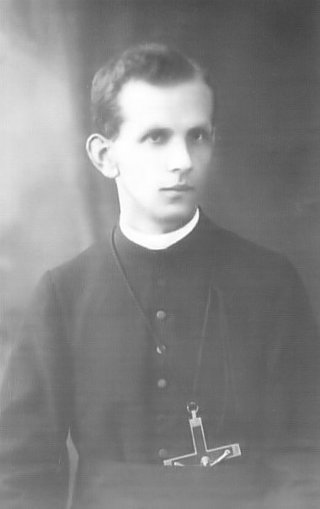Seliger Jósef Cebula OMI

Personalia
Born:
Died:
Profession:
Persecution:
Detention 18.09.1939 (short time)
Imprisonment 02.04.1941 - 18.04.1941,
Mauthausen concentration camp 18.04.1941 - 09.05.1941,
Murdered on 09.05.1941
KZ Number:
Curriculum Vitae
Jósef Cebula was born in Malnia in the archdiocese of Wrocław, now the diocese of Opole, as the first of three children of Adrian and Rosalia Cebula. After elementary school, he attended the Königliche Katholische Präparanden-Anstalt in Opole from 1916 to 1918, probably with the aim of becoming a teacher, but had to interrupt his education due to illness. In September 1920, he continued his schooling at the religious grammar school of the Oblates of Mary Immaculate (Oblate Missionaries) in Krotoszyn, where he graduated in 1921. He joined the order on August 14, 1921 and took his first vows a year later. He studied theology and philosophy, first in the order's own house of studies in Liège and later in Lubliniec. In 1925, he made his perpetual profession and was finally ordained a priest in 1927 after completing his studies.
Jósef Cebula had already been teaching at the Oblate Juniorate in Lubliniec since 1923 and became novice master of the Polish Province of the Order and superior of the novice house in Markowice in 1937.
After the Third Reich and the Soviet Union invaded Poland, the Catholic Church, like many other groups, was persecuted. The National Socialists deported around 8,000 priests and seminarians to concentration camps in the part they occupied. Jósef Cebula was imprisoned for a short time on September 18, 1939, together with other confreres, after 15 German soldiers were killed in an action by Polish resistance fighters. On May 4, 1940, Jósef Cabula witnessed the deportation of his novices to the Dachau concentration camp and on October 31, 1940, the monastery was expropriated by the National Socialists and the remaining priests, including Jósef Cebula, were expelled within three hours.
Jósef Cebula eked out an existence as a civilian worker and tried to circumvent the ban on pastoral care imposed by the National Socialists. When, on December 8, 1940, the high Marian feast day of the order, the feast of the Immaculate Conception, he received the cynical order as superior to appoint some Oblate missionaries to destroy statues of the Madonna in the chapels in the area, he stubbornly refused to do so.
He worked as a laborer during the day and performed his priestly duties underground at night. Jósef Cebula secretly holds church services, administers the sacraments to the dying, baptizes children, marries couples and hears confessions. Although on February 10, 1941, he personally received a strict ban on performing his priestly duties and providing pastoral care, he ignored it. When he administered the last rites to a sick woman in Aymyslowice on April 2, 1941, he was denounced and immediately arrested by the Gestapo. After a short stay in Inowraclaw, Jósef Cabula was deported to the Mauthausen concentration camp as protective custody prisoner no. 70 on April 18, 1941.
According to witness reports, Jósef Cebula was subjected to particularly brutal treatment. Shortly after his arrival at the concentration camp, he was visited in the prisoner block by two SS men who beat him with sticks in the washroom for over an hour. He lost consciousness several times. This procedure was repeated several times over the following days. During this torture, he was forced to sing church hymns and was ridiculed.
On May 9, 1941, while working in the Wiener Graben quarry, the guards began an extremely cynical undertaking at 9 a.m. on the orders of SS-Oberscharführer Hans Spatzenberger. He was forced to walk towards the death strip surrounding the camp. Shortly before reaching the strip, which was secured by an electronic fence, he was ordered to turn back. He has to do this several times until the command "Back! Entering the death strip, Jósef Cebula finally runs into the machine gun fire that is opened on him from the watchtowers. He is killed instantly. His body was burned in the camp crematorium.
Jósef Cebula was beatified by Pope John Paul II in Warsaw on June 13, 1999.
[Note: SS-Oberscharführer Hans Spatzenberger was executed by hanging in Landsberg am Lech in 1947 after a proper war crimes trial at which he was found guilty. His last words were: "I am not a war criminal. Long live Germany. Goodbye, Mr. Pastor."]
Citations
- Mikrut, Jan (2000): Blutzeugen des Glaubens. Martyrologium des 20. Jahrhunderts. Band 2 (Wien), p. 99–107.
